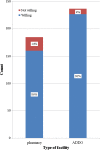A decade since sulfonamide-based anti-malarial medicines were limited for intermittent preventive treatment of malaria among pregnant women in Tanzania
- PMID: 30400908
- PMCID: PMC6219183
- DOI: 10.1186/s12936-018-2565-1
A decade since sulfonamide-based anti-malarial medicines were limited for intermittent preventive treatment of malaria among pregnant women in Tanzania
Abstract
Background: Despite the development of resistance to Plasmodium falciparum malaria, sulfadoxine-pyrimethamine is still effective for intermittent preventive treatment of malaria in pregnancy (IPTp). In Tanzania, more than 10 years have passed since sulfadoxine-pyrimethamine and sulfamethopyrazine-pyrimethamine (SPs) were reserved for IPTp only. However, the retail pharmaceutical outlet dispensers' knowledge and their compliance with the policies have not been recently explored. Therefore, this study was designed to investigate dispensers' knowledge about these medications together with their actual dispensing practices, a decade since they were limited for IPTp use only.
Methods: This descriptive cross-sectional study was conducted between February and July 2017 in all municipalities of Dar-es-Salaam city. Data were collected by direct interviews using a structured questionnaire to assess knowledge and a simulated client approach was used to assess the actual practice of medicine dispensers. Data analysis was done by using SPSS version 20 and Chi square test was used to test significant differences in proportions between different categorical variables. A p-value of less than 0.05 was considered to be statistically significant.
Results: A random sample of 422 medicine dispensers participated in this study whereby 185 (43.8%) were from community pharmacies and 237 (56.2%) from accredited drug dispensing outlets. The study revealed that SPs were available in 76% of the community pharmaceutical outlets in Dar es Salaam. In general majority of the dispensers (64%) had moderate to high knowledge about SPs and their indication. About 80% of the dispensers were aware that SP is reserved for IPTp. However, irrespective of the level of knowledge, almost all dispensers (92%) were willing to dispense the medicines for the purpose of treating malaria, contrary to the current Tanzania malaria treatment guideline.
Conclusion: Majority of the medicine dispensers in the community pharmaceutical outlets were knowledgeable about SPs and their indications. Disappointingly, almost all dispensers irrespective of their levels of knowledge were willing to dispense SPs for treatment of malaria contrary to the available treatment guidelines.
Keywords: Availability; Knowledge; Medicine dispensers; Practice; Sulfonamide-based antimalarials.
Figures
Similar articles
-
Effect of sulfadoxine-pyrimethamine doses for prevention of malaria during pregnancy in hypoendemic area in Tanzania.Malar J. 2020 Apr 19;19(1):160. doi: 10.1186/s12936-020-03234-4. Malar J. 2020. PMID: 32306955 Free PMC article.
-
Intermittent preventive treatment of malaria during pregnancy: a qualitative study of knowledge, attitudes and practices of district health managers, antenatal care staff and pregnant women in Korogwe District, North-Eastern Tanzania.Malar J. 2005 Jul 20;4:31. doi: 10.1186/1475-2875-4-31. Malar J. 2005. PMID: 16033639 Free PMC article.
-
Systemic constraints continue to limit coverage of intermittent preventive treatment for malaria in pregnancy in southeast Tanzania.Int Health. 2013 Jun;5(2):126-31. doi: 10.1093/inthealth/iht005. Int Health. 2013. PMID: 24030112
-
Safety and toxicity of sulfadoxine/pyrimethamine: implications for malaria prevention in pregnancy using intermittent preventive treatment.Drug Saf. 2007;30(6):481-501. doi: 10.2165/00002018-200730060-00003. Drug Saf. 2007. PMID: 17536875 Review.
-
From evidence to action? Challenges to policy change and programme delivery for malaria in pregnancy.Lancet Infect Dis. 2007 Feb;7(2):145-55. doi: 10.1016/S1473-3099(07)70026-9. Lancet Infect Dis. 2007. PMID: 17251085 Review.
Cited by
-
Sulfonamide based pyrimidine derivatives combating Plasmodium parasite by inhibiting falcipains-2 and falcipains-3 as antimalarial agents.RSC Adv. 2024 Aug 7;14(34):24725-24740. doi: 10.1039/d4ra04370g. eCollection 2024 Aug 5. RSC Adv. 2024. PMID: 39114436 Free PMC article.
References
-
- WHO. World malaria report 2017. Geneva: World Health Organization; 2017.
-
- National Bureau of Statistics Tanzania. Tanzania Demographic and Health Survey and Malaria Indicator Survey (TDHS-MIS) 2015–2016. Dar es Salaam, 2016.
MeSH terms
Substances
LinkOut - more resources
Full Text Sources
Medical



